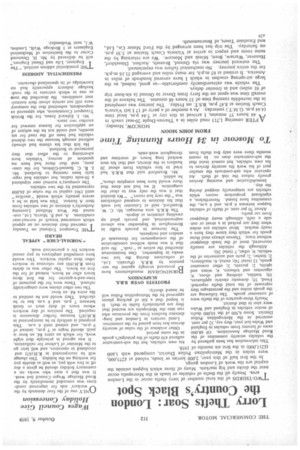Lorry Thefts Soar: London the Country's Black Spot
Page 30

If you've noticed an error in this article please click here to report it so we can fix it.
TWO-THIRDS of the total number of lorry thefts occur in the London I area. Nearly all the thefts of vehicles or loads in the Metropolis occur near the docks and big markets. Many of those which happen outside the capital are the work of London gangs.
In the first half of this year, 2,000 lorries or loads, valued at £275,000, were stolen in the Metropolitan Police District, compared with 1,600 (£211,000) in the first six months of 1958.
This information has been gathered by the vehicles security committee of the Road Haulage Association. Of 68,000 . cases of larceny from vehicles in England and Wales last year, they say, 32 per cent. occurred in the Metropolitan Police District. Some 6,500 of the 10,000 thefts of motor vehicles in England and Wales were also in that district.
Nearly three-quarters of the thefts were of consumer goods. The following are the goods stolen and the percentages they represent of the total thefts reported: Food, 35; domestic electric appliances, 10; textiles, clothing and shoes, 9; cigarettes and tobacco, 4; wines and spirits, 2; parcels, 2; other consumer goods, 12 (total 74); metal, 6; machinery, 2; timber, 2; parts and accessories of the vehicle, 9; other, 7 (total 26).
Although the vehicles are usually recovered, most of the loads disappear without trace. Thieves always steal those goods for which they know they have a ready market. Most vehicles are stolen when they are parked in a street or outside a cafe, although many disappear from car parks.
About 70 per cent, of thefts of vehicles happen between 6 p.m. and 6 a.m., the committee have found. Nevertheless, a significant proportion occurs while vehicles are temporarily stopped during the day.
Immobilization and warning devices greatly reduce the risk of theft. An operator who sub-contracts the smaller part of his work fits security devices to his own vehicles, but cannot insist that the sub-contractor does so. In recent months there were only five thefts from his own vehicles, but the sub-contractor suffered 450 thefts of the principal's goods in the same period.
Other evidence of the value of security devices has been gained by the committee.
Local carriers in London and longdistance hauliers from the provinces who run into the Metropolis are warned that they are particularly liable to theft. It is hoped that a list of parking places approved by the Metropolitan Police will be issued shortly.
PROTESTS OVER B.R.S. SUSPENSION
BI RM ING HAM manufacturers have protested strongly against the suspension by B.R.S. (Parcels), Ltd., of collections during the last two weeks in September,. One businessman described the action as "rash." He said that it was made without consideration of the consequences for thousands of senders and recipients.
The increase in parcels traffic in Birmingham in September was almost unprecedented, and parcels piled up awaiting attention at depots.
The B.R.S. area manager, Mr. C. W. Bramford, said at Leicester last week that his decision to suspend collections was " the very last resort." "We decided that it was the only way to clear the congestion. If we had not done that there would have been complete chaos," he added.
Mr. Bramford said that B.R.S. had tried to hire vehicles from about 20 hauliers in the district, and that his men worked long hours of overtime and throughout week-ends.




































































































